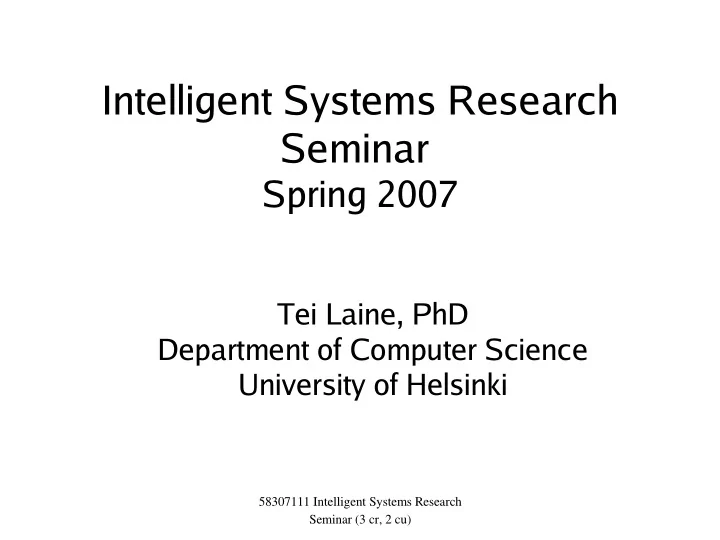

Intelligent Systems Research Seminar Spring 2007 Tei Laine, PhD Department of Computer Science University of Helsinki 58307111 Intelligent Systems Research Seminar (3 cr, 2 cu)
1. Thought experiment ● What is the most basic issue that distinguishes human beings from other animals? ● Assume you are given a set of samples: – Descriptions of human beings. – Descriptions of non-human animals. ● Your task is to come up with a single rule that classifies the samples to respective classes correctly and perfectly. 58307111 Intelligent Systems Research Seminar (3 cr, 2 cu)
X is human, if Which rule would it has/does/is you use? A 58307111 Intelligent Systems Research Seminar (3 cr, 2 cu)
2. Human evolution ● Charles Darwin (1871), The Descent of Man . – “There is no fundamental difference between man and the higher mammals in their mental faculties.” – Individuals differ greatly in every mental characteristic. – Humans have, perhaps, fewer and more basic instincts than their closest relatives. – Animals with more sophisticated instincts are higher in intelligence. 58307111 Intelligent Systems Research Seminar (3 cr, 2 cu)
2.1 Traits shared by humans and animals ● Lower instincts: ● More intellectual emotions and faculties: – Pleasure and pain, – Ennui, excitement happiness and misery – Terror, suspicion – Wonder, curiosity – Courage and timidity – Imitation – Rage – Attention – Revenge, jealousy, and – Memories of things – Imagination (and deceit – Agony of death, dreams) – Reasoning, association maternal affection – Shame, pride of ideas 58307111 Intelligent Systems Research Seminar (3 cr, 2 cu)
2.2 Traits that may not be shared ● Abstraction vs. general conceptions, self- consciousness – Hard to know what is in another being's mind. – No consensus what these concepts mean. ● Language ● Sense of beauty ● Religion, superstition 58307111 Intelligent Systems Research Seminar (3 cr, 2 cu)
2.3 Minds and manners ● Hornaday, William (1922) – Study animals in their natural environment doing what they are inclined to do. – Animal intelligent can be estimated by ● General knowledge of their surroundings ● Independent observations and reasoning ● Memory ● Comprehension under tuition ● Accuracy in exectution of orders ● Various moral qualities (amiability, patience, courage, ...) 58307111 Intelligent Systems Research Seminar (3 cr, 2 cu)
2.4 Animal cognition ● In studying animal cognition, it is important to understand (Hauser, 2000) – findings in neurosciences, particularly the anatomy of brain. – human infant development. ● Questions we shouldn't ask: – Do animals think?, Are animals conscious?, Are some animals more intelligent than others? – These are vague. – Rely on what humans do. 58307111 Intelligent Systems Research Seminar (3 cr, 2 cu)
● Questions we should ask are more specific: – What is animals' capacity to ● use tools? ● solve problems in symbolic format? ● find its way home? ● understand its beliefs and those of others? ● learn by imitation? – Do animals have emotions? – Do animals communicate? – Are animals guided by instinct? – Do they have rules they abide to, and sometimes break? ● The goal to keep in mind: – What can we learn from animals to advance artificial intelligence research and applications? 58307111 Intelligent Systems Research Seminar (3 cr, 2 cu)
2.5 Tentative topics 1. Introduction 2. Anthropomorphism and comparative analysis 3. Brain and neurophysiology 4. Learning and adaptive specialization 5. Memory and time binding 6. Imitation and social learning 7. Self-awareness and consciousness 8. Theory of mind 9. Language 10. Perception and face recognition 11. Mental tool kits 58307111 Intelligent Systems Research 12. Paper reports Seminar (3 cr, 2 cu)
2.6 Animals ● Humans ● Apes and monkeys ● Various birds (crows, pigeons, parrots, jays, ...) ● Spiders, lizards ● Fish and dolphins 58307111 Intelligent Systems Research Seminar (3 cr, 2 cu)
3. Seminar policies ● Instructor and office hours: – Tei Laine, Mon, Wed 12-12.30 @A213 ● Meetings – Thu 10-12, @B119 ● For each meeting – Read one or more articles given in the reading list. – Be prepared to discuss the topics introduced in the articles. – Write a one-page essay in which you either ● Discuss questions raised by the reading, ● address the articles' points of relevance and interest, ● relate the readings to something you already know, or ● propose future lines of studies. – Submit the essay on paper (remember to write your name) 58307111 Intelligent Systems Research Seminar (3 cr, 2 cu)
3.1 Important notice! ● You don't have to read everything from start to finish, but you should read something! – That's why you have choice. ● Beware, most of the readings are non-computer science texts: – They use terminology you may not be familiar with. – They introduce methods that you've not encountered before. – Come to the meetings with questions! 58307111 Intelligent Systems Research Seminar (3 cr, 2 cu)
3.2 Term paper ● A research article on the topic of your choice – Each student is asked to schedule a short meeting with me to discuss the paper topic. – Preliminary outline of the article due by the break. – Either in Finnish or in English — same rules apply regarding ● Correct and complete sentences ● Grammar ● Nice formatting ● Proper citations – At the end of the semester everyone gives a short(!) presentation on their paper. 58307111 Intelligent Systems Research Seminar (3 cr, 2 cu)
Recommend
More recommend